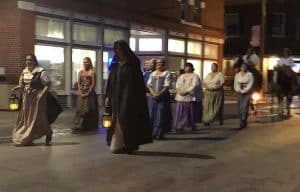Columbia School Board talks taxes and more
This month’s Columbia School Board meeting prompted a handful of discussion topics, with potential district growth and Illinois Association of School Board resolutions taking up the majority of the meeting.
Tax levy
At last Wednesday’s meeting, the board discussed what amount the district is requesting to levy during the 2021 property tax year, payable in fiscal year 2022-23. In keeping with previous years, the board is requesting to levy 4.95 percent more than the $13,175,788.63 it had received last year.
If granted this, the board would be receiving $13,828,764.
As Columbia Superintendent Chris Grode explained, this is not necessarily how much money from property taxes the district will levy. How much the district will actually receive is constrained by the equalized assessed value, which is determined at a later date, as well as individual tax rates placed on each fund.
“You’re not guaranteed to get the 4.95 (percent) because the county has to do the calculations to set the tax rate. But you won’t get anything that you don’t ask for,” Grode explained.
The school board avoided needing to have a hearing on this matter, as they requested an increase under 5 percent.
Next month, the district will take action to finalize the request.
Facility study
In ongoing discussions of new housing possibly leading to more growth, an enrollment report, housing data and facility study posed two main questions: With housing in the district growing, why isn’t enrollment? Will the schools have enough room to support an enrollment increase that may come in the next 10 years?
Grode had asked the city for the number of lots and units of housing created over the last decade within district bounds, which he presented to the board along with a corresponding enrollment breakdown.
“We’ve had a lot of growth in houses in the last 10 years,” Grode said. “Our total enrollment was 2,097 in the 2011-12 school year. This year it’s 1,952, so we’ve gone down in the last 10 years with these new houses coming in,” Grode summarized for the board.
As board member Tammy Mitchell Hines – who owns a real estate agency – pointed out, the housing data the board had may not necessarily be best representing the situation.
“This is just showing, probably, anything new that has been approved in the last 10 years, not necessarily what has been built,” Hines said, adding, “What the question might be to the city is ‘How many new construction permits did we have over the past 10 years?’”
Even so, seeing the city is growing, the question of why enrollment is not still stands. Grode said the board will ask for feedback from families who have left the district and consider that when moving forward.
Assuming the district will see an “influx” in houses in the next 10 years, they are now considering if their current facilities would meet the needs associated with more families moving to the area.
In the facility study Grode presented, he noted Eagleview is “extremely full” and Parkview and the high school are reaching this capacity as well. Moving district offices out of Parkview and into the middle school, which has considerably more room than other buildings, could free up space for more students at Parkview.
“As we’re looking at our enrollments, looking at our facilities, we need to start having a discussion as to ‘What do we think the next 10 years are going to bring us as far as students, and how do we make sure we won’t get slammed with overcrowding if we happen to go up?’” Grode said.
IASB resolution
The board had tabled deciding which Illinois Association of School Board resolutions to support and oppose previously to allow for community input. At last Wednesday’s meeting, board members finalized their stances.
Each district receives a vote to support or oppose each resolution, and the IASB will take action on those with majority support. As the district’s chosen representative, Hines recently cast Columbia’s votes at a conference.
Those who do not attend the conference, such as the Waterloo School District, do not vote on the resolutions, Waterloo Superintendent Brian Charron said.
Columbia decided to oppose the “Child Safe Gun Storage” resolution, in accordance with the IASB Resolutions Committee Rationale. The resolution, brought forth by Glen Ellyn School District No. 41, asks IASB to advocate for legislation that requires gun owners to store both loaded and unloaded firearms in “a securely locked container.”
This is intended to reduce the chances of a child accessing it without permission.
“Our rules and governance … basically stop with the school, it’s not in the homes, it’s not reaching out and governing the community, it’s what we do at the schools for the kids and for the learning environment,” board member Adam Hemken said. “To support this resolution would be overreach, and I think we’ve had enough of that already.”
The idea of local control was brought up several times during the discussion.
School board president Greg Meyer and member Scott Middelkamp supported the “Student Safety and Protection Plan” resolution on this basis.
The resolution supports districts being able to decide to implement student safety and protection plans that can “allow voluntary district employees, in any capacity, the ability to carry a concealed firearm on district property,” if the employee has a valid state Firearm Owners Identification card and meets other safety requirements.
“I am good with it because it is based on local control, and also some (Illinois) districts are very rural,” Middelkamp said. “We are very fortunate just to have the police station right here,” with Grode adding some schools do not have SRO officers.
Seeing that the final resolution, titled “Physical and Mental Health of Students,” recommends – not requires – parents “provide for regular and ongoing” vision, dental and physical exams for their students and “encourages school districts to consider adopting a policy requiring optometric vision examinations for all children entering kindergarten,” the board decided to support the resolution.
Giving individual districts the authority to decide matters impacting them was also included in the board’s positions on the “Health and Sex Education Curriculum” resolution, those relating to charter schools and more.
The “Indigenous People Curriculum Inclusion” resolution prompted much discussion from the board. It reads, “The Illinois Association of School Boards shall support legislation to include the study of Native Americans/Indigenous People for Social Studies content and U.S. History.”
Meyer was the first to voice his opinion on this resolution.
“I’m a little hesitant in going down this path, this is not too far off from CRT (Critical Race Theory) in my view,” Meyer said. “You’re picking out a certain group of people above everybody else and concentrating on them. It’s just where do you stop it, where do you start it? I think this is the start of it, personally.”
Grode said Columbia’s “curriculum probably wouldn’t change,” but it might make other schools include Indigenous Peoples in their curriculum, along with other discussion and hearing from a former student who said she learned about Indigenous Peoples while at Columbia High School, the board decided to support this resolution.
The board decided to oppose the “Cannabis Sales” resolution, which, if passed, will give 20 percent of state tax revenues from cannabis sales to “public education programs that support youth development, violence prevention and health education.”
This decision came after Meyer expressed concern with how the money would be allocated.
“This is to distribute more money to disadvantaged districts, which would be taking money away from us,” he said.
For a full list of the resolutions and their descriptions, see the 2021 Resolutions Committee Report be clicking here.







